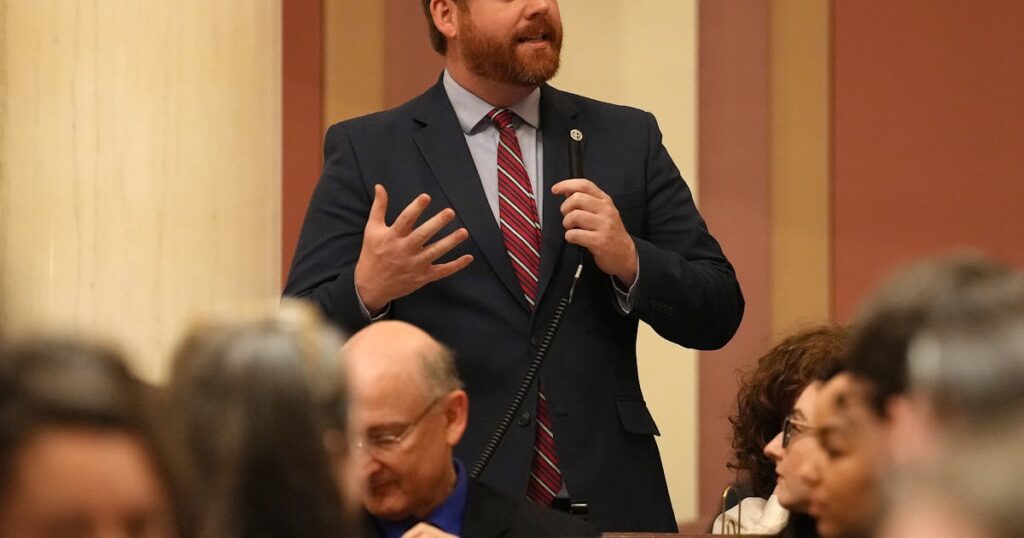House sponsors of a sports betting bill announced an agreement Tuesday to resolve the electronic pull-tab issue that could derail the entire gambling legalization effort.
Rep. Zach Stevenson, DFL Coon Rapids, said the agreement he brokered will address the concerns of Allied Charities of Minnesota (ACM), which operates charity pull-tab businesses in bars and restaurants across the state.
“There is still a lot of work to do to pass a sports betting bill, but this is a very important step in the right direction,” Stevenson said.
ACM has been concerned that changes to electronic pull tabs could reduce revenue. In 2023, DFL-controlled Congress banned the “open-all” feature on electronic pull tabs. This meant that tabs had to be opened individually instead of with one touch. The charity argued this would slow down the use of pull tabs.
The electronic pull tab change comes after years of legal challenges and lobbying efforts by tribes. Since the state's tribes were legalized as part of the U.S. Bank Stadium construction bill in 2012, electronic pull tabs have become so popular that they mimic slot machines, and the tribes' monopoly on operating casino games in the state has increased. He claimed that his rights were being violated.
Tensions over electronic pull tabs were not at the heart of Minnesota's push to legalize sports betting, but it could cost votes on an issue that requires broad bipartisan support for passage. Republicans were particularly displeased with the change, which could have a negative impact on charities in the state's smaller communities.
Under Stevenson's agreement, the charity agrees not to ask Congress to change the Electronic Pull Tab Act of 2023 to ban the open-all feature. Instead, Stevenson said taxes on sports betting would increase from 10% to 20% to pay for the $40 million in charitable gambling tax cuts.
Stevenson said he is working with tribes and philanthropic organizations to reach a “lasting agreement” on pull tabs beyond the end of the session in 2023. “I am pleased to report that we have found an agreement that is acceptable to both the charity and the tribe,” he said.
Stephenson said during a State and Local Government Fiscal Policy Committee hearing Thursday that he plans to include the agreement in a bill to legalize sports betting. He noted that that would require a committee vote, and that the underlying gaming bill still has several committee stops before it can be voted on in the House.
Charitable gambling operations fund all types of operations in the state, from services for veterans to youth sports, public safety facilities, and services for people with disabilities. Stevenson said the taxes from sports betting would be a “huge benefit” to organizations ranging from the American Legion to youth hockey clubs.
Rachel Jenner, executive director of Allied Charities, issued a letter of support for the agreement, saying, “We look forward to the passage of the Sports Betting Act and providing much-needed tax relief to Minnesota charities. “This historic tax cut will allow us to provide better service.” community. ”
The St. Paul-based organization represents more than 500 charities across the state. Jenner said adding $40 million to $15 million in gambling tax relief for charities in 2023 would give charities more revenue than they paid in taxes for the first time.
Instead, the ACM will not seek a review of the electronic pull-tab regulation “at least until the full impact and tax savings of the game changes have been jointly assessed,” Jenner said.
He also noted that charitable gambling in Minnesota leads the nation, with charitable gambling directing $157 million to nonprofit organizations and contributing $193 million to the state treasury through taxes in fiscal year 2022. Also mentioned.
In the Senate, Sen. Jeremy Miller (R-Winona) called Stevenson's agreement “a step in the right direction” and important aid to charities, but said racetracks also have “fair benefits.” “We will continue to make efforts to bring about this.” From any suggestion.
The state's two racetracks have repeatedly argued that any expansion of sports betting should include them.
Sen. Matt Klein (DFL-Mendota Heights) is the lead sponsor of the Senate bill, which is currently awaiting action in the Senate Elections Committee. He declined to comment because he had not seen Stevenson's agreement.
The Senate Taxation Committee last week approved a legalization bill that would change the tax rate to 20% and donate 20% of the levy to charitable gambling operations, youth sports, gambling addiction programs, and tourism.
However, the Senate bill also includes a “whistle-to-whistle” ban on in-game gambling, which gambling platforms oppose. The rules only allow bets on the outcome of a game, not series bets on specific plays, scores, pitches, or other in-game activities.
The provision, introduced by Sen. Jordan Rasmusson (R-Fergus Falls), was added when the bill was introduced in the Commerce Committee earlier this month.
The Minnesota Indian Gaming Association did not respond to a request for comment.


